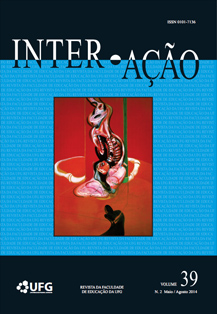DIALÉTICA NEGATIVA: FILOSOFIA E METAFÍSICA - TENSÕES
DOI:
https://doi.org/10.5216/ia.v39i2.31706Palavras-chave:
Dialética negativa, Metafísica, Theodor Adorno, Friedrich HegelResumo
Este ensaio se propõe a analisar o conceito de Metafísica desenvolvido por Theodor Adorno na “Parte III, Modelos”, de seu livro Dialética Negativa. Inicialmente se detém na abordagem da categoria dialética negativa, que se constitui no diálogo com Hegel e, ao mesmo tempo, em contraposição à sua dialética idealista, tomando como referência o pressuposto de que somente o conceito pode ultrapassar o conceito e assim se aproximar do não-conceitual. A seguir, à semelhança do processo anterior, denota o texto que o frankfurtiano, na construção de uma nova metafísica, não abandona as categorias específicas que historicamente lhe deram sustentabilidade, porém, inverte-as na tendência de sua direção: a metafísica negativa emigra para a micrologia, para “a escória do mundo dos fenômenos”. Conceitos-chave da metafísica tradicional -- essência, infinitude e profundidade --, no contexto da primazia do objeto sobre o sujeito, se voltam agora para “as coisas dos homens”. O ensaio mostra, ainda, que Adorno, instigado pela observação de Simmel, de como é espantoso o quão pouco os sofrimentos da humanidade são observados na história da filosofia, construída numa perspectiva idealista, se volta para a análise da dor, dos lamentos, do genocídio, tristes realidades que caracterizam a história dos homens em tempos de sociedades capitalistas.
Downloads
Downloads
Publicado
Como Citar
Edição
Seção
Licença
A Inter-Ação utiliza como base para transferência de direitos a licença Creative Commons Attribution 4.0 para periódicos de acesso aberto (Open Archives Iniciative - OAI). Por acesso aberto entende-se a disponibilização gratuita na Internet, para que os usuários possam ler, baixar, copiar, distribuir, imprimir, pesquisar ou referenciar o texto integral dos documentos, processá-los para indexação, utilizá-los como dados de entrada de programas para softwares, ou usá-los para qualquer outro propósito legal, sem barreira financeira, legal ou técnica.
Autores que publicam neste periódico concordam com os seguintes termos:
1) Autores mantém os direitos autorais e concedem à revista o direito de primeira publicação, com o trabalho simultaneamente licenciado sob a Licença Creative Commons Attribution que permite o compartilhamento do trabalho com reconhecimento da autoria e publicação inicial nesta revista.
2) Autores têm autorização para assumir contratos adicionais separadamente, para distribuição não-exclusiva da versão do trabalho publicada nesta revista (ex.: publicar em repositório institucional ou como capítulo de livro), com reconhecimento de autoria e publicação inicial nesta revista.
3) Autores têm permissão e são estimulados a publicar e distribuir seu trabalho online (ex.: em repositórios institucionais ou na sua página pessoal) a qualquer ponto antes ou durante o processo editorial, já que isso pode gerar alterações produtivas, bem como aumentar o impacto e a citação do trabalho publicado.















